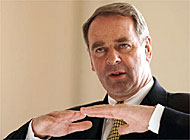Adolf Ogi bids farewell to power

After 13 years in government, the defence minister and this year's president, Adolf Ogi, is retiring at the end of this week. Ogi was one of Switzerland's most charismatic political figures - a man rarely out of the headlines.
Ogi entered government in 1987 as transport, energy and communications minister and eight years later took over as defence minister.
In that time, he chalked up more than 600 cabinet meetings, lasting 2,600 hours, and was involved in over 30,000 affairs of state.
“It was a rich time, an interesting time, a hard time, but a good time. It was worth it,” Ogi told swissinfo.
There was rarely a moment when Ogi was out of the public view – for personal and political reasons.
Politically, he campaigned to end Switzerland’s isolation but found himself increasingly at odds with his own right-wing Swiss People’s Party. And as someone who was seen as close to the people, he often made headline news.
To many people, he was breath of fresh air in the cabinet – a man from the countryside rather than the city; a man without a university education; a keen sportsman turned politician; a man with natural warmth who could communicate with people at different levels.
His critics pointed to his political conservatism, his failure to master other languages, and looked down on countryside origins. But whereas a book of jokes about Ogi, culled from the defence ministry, sold well, it was books and even a Rap CD produced after he announced his retirement which made the best-seller lists.
Ogi told swissinfo there were many successes and defeats in his career. “I’m happy about my 13 years in government. I’ve served my country, I haven’t damaged the country in any way – and that leaves me a happy man.”
He faced some of his biggest domestic conflicts within his own People’s Party. As a member of the more liberal Bern-based wing of the party, he was in almost constant conflict in the 1990s with the Zurich-based hardline section, led by the populist, Christoph Blocher.
In contrast to many members of his party, Ogi was committed to opening Switzerland to the outside world. This meant European integration, United Nations membership, and closer ties to Nato.
One of his – as well as the government’s – most significant defeats was in December 1992 when the Swiss people rejected membership of the European Economic Area. But Ogi later took Switzerland into Nato’s Partnership for Peace programme, and recently pushed through key army reforms.
He was a politician who relished the international spotlight, bringing his own down-to-earth style, bred in the Bernese Oberland, to a much wider arena.
Last autumn, for example, Ogi took the United Nations secretary-general, Kofi Annan, on a two-day walking tour, starting in his home town of Kandersteg. It was typical of Ogi: relishing the international stage, but staying close to his roots.
He also worked incredibly hard – both on a personal and political level. In one week alone this year, Ogi became the first Swiss president to address the United Nations General Assembly in New York, went to China to celebrate the 50th anniversary of Sino-Swiss diplomatic relations, and from there proceeded to Sydney for the Olympic Games.
“The price was very high,” he told swissinfo. “My family had to do without me completely. I was completely single-minded – being a member of the cabinet and concentrating on official activities – and that had clear consequences. But my family was very understanding, and supported and accompanied me, and helped me to be successful.”
Ogi remains coy about his future. He has been linked with numerous other posts, particularly within international sports bodies, but says he will only break his silence in the New Year.
by Ron Popper

In compliance with the JTI standards
More: SWI swissinfo.ch certified by the Journalism Trust Initiative
You can find an overview of ongoing debates with our journalists here . Please join us!
If you want to start a conversation about a topic raised in this article or want to report factual errors, email us at english@swissinfo.ch.